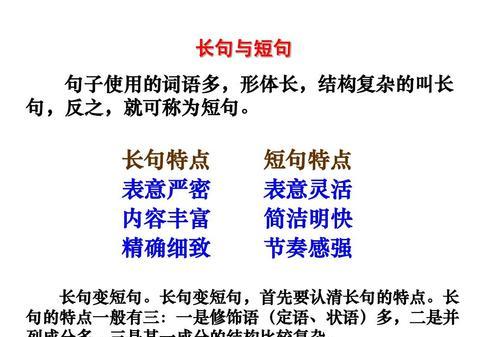英语句子可分为整散句和长短句。整句自身能表达完整意思,如"I am a student.";散句需要借助其他句子完整表达意思,如"Although it was raining, I still went for a walk.";长句包含多个从句,需要分析理解,如"The book, which was written by a famous author, has been on the bestseller list for weeks.";短句较短,表达简单意思,如"She sings well."。选择句子类型需根据具体情况。

整句
整句是指句子自身就可以表达完整的意思,常见的整句有:
- I am a student.(我是一名学生。)
- She loves reading books.(她喜欢读书。)
- They went to the park yesterday.(他们昨天去了公园。)
这些整句都包含了主语、谓语和宾语,能够独立表达一个完整的意思。
散句
散句是指句子不完整,需要借助其他句子来表达完整的意思。常见的散句有:
- Although it was raining.(尽管下雨了。)
- Without your help.(没有你的帮助。)
- If I have time.(如果我有时间。)
这些散句需要依靠后面的句子来表达完整的意思,例如:
- Although it was raining, I still went for a walk.(尽管下雨了,我还是去散步了。)
- Without your help, I couldn't have finished the project on time.(没有你的帮助,我不能按时完成这个项目。)
- If I have time, I will go to the party tonight.(如果我有时间,我今晚会去参加聚会。)
长句
长句是指句子过长,包含多个从句,需要仔细分析才能理解。常见的长句有:
- The book, which was written by a famous author, has been on the bestseller list for weeks and has received high praise from critics.(这本书是由一位著名的作家所写,已经连续几周跻身畅销书榜,并得到评论家的高度赞扬。)
- After finishing his homework, he went to bed, but he couldn't fall asleep because he was too excited about the upcoming trip.(他完成了作业后就去睡觉了,但是他因为即将到来的旅行太兴奋了,所以无法入睡。)
这些长句包含多个从句,需要通过分析来理解其中的逻辑关系。
短句
短句是指句子较短,通常只包含主语和谓语,表达简单的意思。常见的短句有:
- She sings well.(她唱歌唱得很好。)
- He is tall.(他很高。)
- They are happy.(他们很开心。)
这些短句表达的意思简单明了,适合用于日常交流和口语表达。
